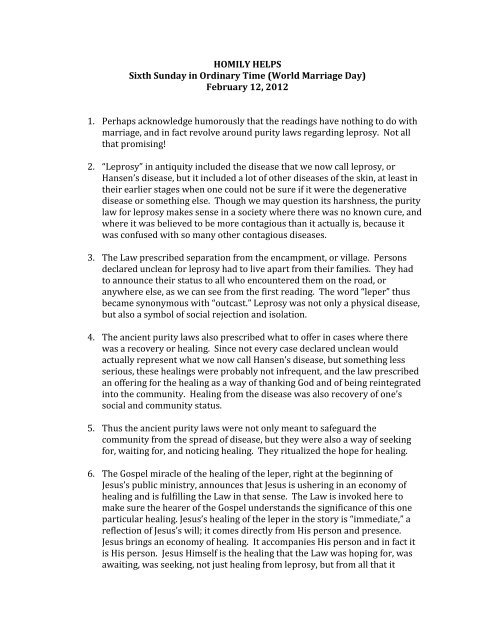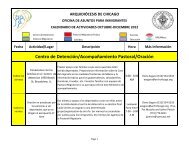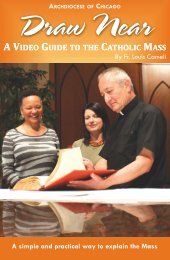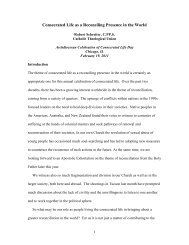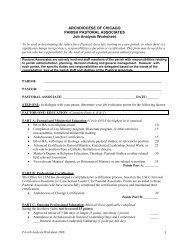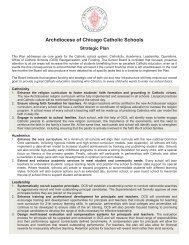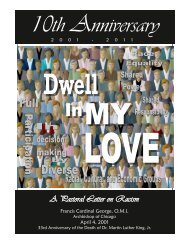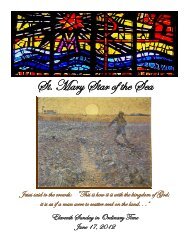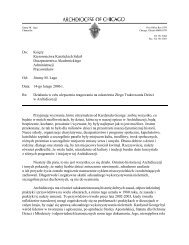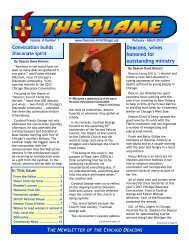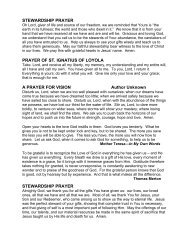HOMILY HELPS Sixth Sunday in Ordinary Time (World Marriage Day)
HOMILY HELPS Sixth Sunday in Ordinary Time (World Marriage Day)
HOMILY HELPS Sixth Sunday in Ordinary Time (World Marriage Day)
Create successful ePaper yourself
Turn your PDF publications into a flip-book with our unique Google optimized e-Paper software.
<strong>HOMILY</strong> <strong>HELPS</strong><br />
<strong>Sixth</strong> <strong>Sunday</strong> <strong>in</strong> Ord<strong>in</strong>ary <strong>Time</strong> (<strong>World</strong> <strong>Marriage</strong> <strong>Day</strong>)<br />
February 12, 2012<br />
1. Perhaps acknowledge humorously that the read<strong>in</strong>gs have noth<strong>in</strong>g to do with<br />
marriage, and <strong>in</strong> fact revolve around purity laws regard<strong>in</strong>g leprosy. Not all<br />
that promis<strong>in</strong>g!<br />
2. “Leprosy” <strong>in</strong> antiquity <strong>in</strong>cluded the disease that we now call leprosy, or<br />
Hansen’s disease, but it <strong>in</strong>cluded a lot of other diseases of the sk<strong>in</strong>, at least <strong>in</strong><br />
their earlier stages when one could not be sure if it were the degenerative<br />
disease or someth<strong>in</strong>g else. Though we may question its harshness, the purity<br />
law for leprosy makes sense <strong>in</strong> a society where there was no known cure, and<br />
where it was believed to be more contagious than it actually is, because it<br />
was confused with so many other contagious diseases.<br />
3. The Law prescribed separation from the encampment, or village. Persons<br />
declared unclean for leprosy had to live apart from their families. They had<br />
to announce their status to all who encountered them on the road, or<br />
anywhere else, as we can see from the first read<strong>in</strong>g. The word “leper” thus<br />
became synonymous with “outcast.” Leprosy was not only a physical disease,<br />
but also a symbol of social rejection and isolation.<br />
4. The ancient purity laws also prescribed what to offer <strong>in</strong> cases where there<br />
was a recovery or heal<strong>in</strong>g. S<strong>in</strong>ce not every case declared unclean would<br />
actually represent what we now call Hansen’s disease, but someth<strong>in</strong>g less<br />
serious, these heal<strong>in</strong>gs were probably not <strong>in</strong>frequent, and the law prescribed<br />
an offer<strong>in</strong>g for the heal<strong>in</strong>g as a way of thank<strong>in</strong>g God and of be<strong>in</strong>g re<strong>in</strong>tegrated<br />
<strong>in</strong>to the community. Heal<strong>in</strong>g from the disease was also recovery of one’s<br />
social and community status.<br />
5. Thus the ancient purity laws were not only meant to safeguard the<br />
community from the spread of disease, but they were also a way of seek<strong>in</strong>g<br />
for, wait<strong>in</strong>g for, and notic<strong>in</strong>g heal<strong>in</strong>g. They ritualized the hope for heal<strong>in</strong>g.<br />
6. The Gospel miracle of the heal<strong>in</strong>g of the leper, right at the beg<strong>in</strong>n<strong>in</strong>g of<br />
Jesus’s public m<strong>in</strong>istry, announces that Jesus is usher<strong>in</strong>g <strong>in</strong> an economy of<br />
heal<strong>in</strong>g and is fulfill<strong>in</strong>g the Law <strong>in</strong> that sense. The Law is <strong>in</strong>voked here to<br />
make sure the hearer of the Gospel understands the significance of this one<br />
particular heal<strong>in</strong>g. Jesus’s heal<strong>in</strong>g of the leper <strong>in</strong> the story is “immediate,” a<br />
reflection of Jesus’s will; it comes directly from His person and presence.<br />
Jesus br<strong>in</strong>gs an economy of heal<strong>in</strong>g. It accompanies His person and <strong>in</strong> fact it<br />
is His person. Jesus Himself is the heal<strong>in</strong>g that the Law was hop<strong>in</strong>g for, was<br />
await<strong>in</strong>g, was seek<strong>in</strong>g, not just heal<strong>in</strong>g from leprosy, but from all that it
symbolized – lack, dis<strong>in</strong>tegration, isolation, empt<strong>in</strong>ess of soul. The heal<strong>in</strong>g<br />
announces Jesus as the fulfillment of the Law.<br />
7. Of course, Jesus did not heal every leper he met, or every sick person. The<br />
heal<strong>in</strong>g that Jesus came to br<strong>in</strong>g is more than a physical heal<strong>in</strong>g; it is His love,<br />
as an <strong>in</strong>vitation to communion with Him <strong>in</strong> eternal life. The physical heal<strong>in</strong>gs<br />
that He accomplished revealed this love, were signs of this love that is the<br />
essence of the Good News. It is God’s love that is heal<strong>in</strong>g <strong>in</strong> every sense of the<br />
word, because it offers <strong>in</strong>tegration <strong>in</strong>to the largest and most beautiful society<br />
of all, the communion of sa<strong>in</strong>ts, a communion of eternal, satisfy<strong>in</strong>g, love.<br />
8. This is where marriage comes <strong>in</strong>. Not as a form of leprosy! Far from it. But<br />
as part of the economy of heal<strong>in</strong>g love that Jesus br<strong>in</strong>gs. <strong>Marriage</strong> is a<br />
communion of two persons, a man and a woman, whose love is configured to,<br />
or shaped by, the very love that Jesus reveals <strong>in</strong> this heal<strong>in</strong>g. Jesus wills to<br />
heal the leper out of His profound and <strong>in</strong>timately personal compassion. It<br />
must have been embarrass<strong>in</strong>g to ask for a heal<strong>in</strong>g! It <strong>in</strong>volved one’s own<br />
body, <strong>in</strong> all likelihood disfigured, still await<strong>in</strong>g heal<strong>in</strong>g, hop<strong>in</strong>g aga<strong>in</strong>st hope.<br />
It is an <strong>in</strong>timate request. Jesus does not embarrass the man but, out of his<br />
immense compassion, heals him <strong>in</strong>stantly and without any str<strong>in</strong>gs attached<br />
except that he obey the law and make a thank offer<strong>in</strong>g.<br />
9. The love that forms the communion between husband and wife is this very<br />
same heal<strong>in</strong>g and compassionate love of Jesus. That is why we call marriage<br />
a sacrament. The compassionate, heal<strong>in</strong>g love of Jesus Christ is <strong>in</strong>timately<br />
and immediately present to spouses <strong>in</strong> their love for each other. Christian<br />
marriage is a particular form of participation <strong>in</strong> this economy of heal<strong>in</strong>g love<br />
that comes from the Lord Jesus. The day <strong>in</strong> and day out fidelity of Christian<br />
spouses to each other is not glitzy or flashy but it is the quiet, progressive<br />
heal<strong>in</strong>g of the soul at the very deepest, most <strong>in</strong>timate, level. Married <strong>in</strong><br />
Christ, the spouses lift each other out of the “leprosy” of a world where<br />
efficiency is often valued over persons, where “hav<strong>in</strong>g” is often valued more<br />
than “be<strong>in</strong>g.” The married couple becomes a new community that is a true<br />
home, each the home for the other, where each may encounter the heal<strong>in</strong>g,<br />
compassionate love of the Lord Jesus “immediately,” as did the leper <strong>in</strong> the<br />
Gospel.<br />
10. What is more, this heal<strong>in</strong>g and compassion extend outward, to the world<br />
itself. The “home” that is the communion of spouses is the focal po<strong>in</strong>t of<br />
renewal <strong>in</strong> the world. It beg<strong>in</strong>s to organize a community, the family,<br />
accord<strong>in</strong>g to the heal<strong>in</strong>g and compassionate love of the Lord, <strong>in</strong>stead of the<br />
alienat<strong>in</strong>g, worldly values of efficiency over persons, and hav<strong>in</strong>g over “be<strong>in</strong>g.”<br />
This is the “domestic church.” These are the ones who have listened to the<br />
Apostle Paul say<strong>in</strong>g, “Be imitators of me, as I am of Christ.”
11. The love between the spouses thus reveals itself more and more as the<br />
heal<strong>in</strong>g and compassionate love of Christ, b<strong>in</strong>d<strong>in</strong>g the spouses ever more<br />
closely to each other. Their union radiates a life of heal<strong>in</strong>g for all of the many<br />
“lepers” the world may have rejected, may have sent one’s way, to feel the<br />
<strong>in</strong>timate and immediate heal<strong>in</strong>g will of the Lord, <strong>in</strong> short, to feel loved, when<br />
they had felt unloved, desperate, or left beh<strong>in</strong>d. Such is the power of heal<strong>in</strong>g<br />
and love that Christian marriage, and the Christian family, offers our world<br />
today.


